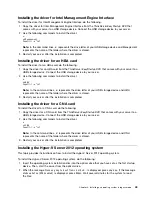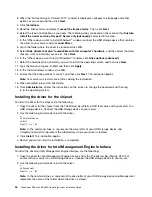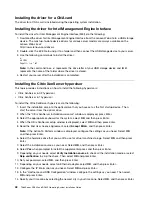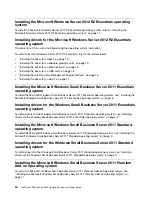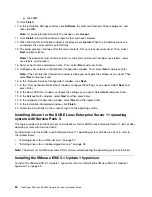
• When prompted, select the option as you need. The following steps are based on the scenario that
you select
Fresh installation
and then click
Next
.
9. Type a name for your server. Then, click
Next
.
10. Specify your time zone by selecting the nearest city in your time zone. Then, click
Next
.
11. Personalize the server by typing the root password for the root user account. Then, click
Next
.
Note:
If a message prompts you that the password is weak, click
Use Anyway
.
12. By default, a partition is already selected for you to install the operating system. If you want to create a
partition manually, select the option as you need and then click
Next
.
Note:
The following steps are based on the scenario that
Create Custom Layout
is selected in this step.
13. In the Please Select A Device window, do one of the following to create a partition and then click
Next
.
• Manually create a root partition (/)
To create a root partition, do the following:
a. Click
Create
. The Create Storage window is displayed.
b. Select
Standard Partition
and then click
Create
.
c. In the Add Partition window, select the forward slash
(/)
from the
Mount Point
drop-down list box.
d. Select
ext4
from the
File System Type
drop-down list box.
e. In the Allowable Drivers window, select the hard disk drive on which you want to install the
operating system.
f. Type the amount of space (in MB) in the New Partitions Size window and then click
OK
.
• Manually create a boot partition (/boot)
To create a boot partition, do the following:
a. Click
Create
. The Create Storage window is displayed.
b. Select
Standard Partition
and then click
Create
.
c. In the Add Partition window, select
/boot/efi
from the
Mount Point
drop-down list box.
d. Select
EFI System Partition
from the
File System Type
drop-down list box.
e. In the Allowable Drivers window, select the hard disk drive on which you want to install the
operating system.
f. Type the amount of space (in MB) in the New Partitions Size window and then click
OK
.
• Manually create a swap partition
To create a swap partition, do the following:
a. Click
Create
. The Create Storage window is displayed.
b. Select
Standard Partition
and then click
Create
.
c. In the Add Partition window, select
swap
from the
File System Type
drop-down list box.
d. In the Allowable Drivers window, select the hard disk drive on which you want to install the
operating system.
e. Type the amount of space (in MB) in the New Partitions Size window and then click
OK
.
14. In the Format Warnings window, click
Format
to format the hard disk drive.
15. In the “Writing storage configuration to disk” window, click
Write changes to disk
.
16. In the “Boot loader operating system list” window, click
Next
.
17. The default installation is a basic server installation. You can customize your server by selecting a
different set of software from the software list or adding additional repositories that you want to use
Chapter 3
.
Installing an operating system in UEFI mode
57
Summary of Contents for ThinkServer RD340
Page 1: ...ThinkServer RD340 and RD440 Operating System Installation Guide ...
Page 6: ...iv ThinkServer RD340 and RD440 Operating System Installation Guide ...
Page 8: ...2 ThinkServer RD340 and RD440 Operating System Installation Guide ...
Page 56: ...50 ThinkServer RD340 and RD440 Operating System Installation Guide ...
Page 68: ...62 ThinkServer RD340 and RD440 Operating System Installation Guide ...
Page 69: ......
Page 70: ......

